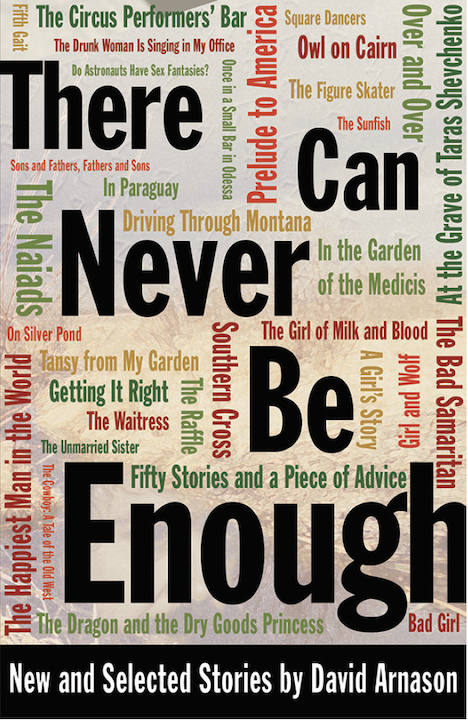There Can Never Be Enough: New and Selected Stories by David Arnason

David Arnason, There Can Never Be Enough: New and Selected Stories, 2014, Turnstone Press.
In “The Snows of Kilimanjaro,” one of Ernest Hemingway’s finest short stories, Harry, the protagonist, is a writer whose marriage to a rich woman and consequent embrace of security and comfort has ruined his writing. He is dying of gangrene on safari in Africa and death’s imminence makes him rampant with memory. What he remembers is the stories he didn’t write: about the wars of which he had been a part, his life in Paris and his experience in the West. “He knew at least twenty good stories from out there and he had never written one. Why?” Harry wonders?
It’s not a question that David Arnason ever need ask himself. In “50 Stories and a Piece of Advice,” included in There Can Never Be Enough, his 14th and most recent book, he sees and then raises Papa Hemingway in the writerly poker game. He’s not bluffing and he wins hands down. His 50 stories are variously romantic, absurdly funny and occasionally devastating. They are a cryptic, miniature demonstration of the virtuosity evident in all 33 stories in the book, of which the first three are new. This is a poignant collection, redolent with the quiet epiphanies and troublesome confusions that woo and vex us as human beings.
What it makes clear is that Arnason is among the most versatile and intelligent short story writers in the country. There are individual stories, like “The Cowboy: A Tale of the Old West,” “Once in a Small Bar in Odessa” and “The Waitress,” in which his tone is flawless, the writing equivalent of perfect pitch. This last story’s opening lines, “The waitress wakes in the grey hurt dawn. She smells smoke on her clothes, grease on her skin,” is a picture as despondent as Émile Zola’s L’Assommoir. It’s worth remembering that Arnason’s knowledge of literature is vast. For TS Eliot, “April is the cruelest month, breeding lilacs out of the dead land,” but in the Old West it’s the messiest, “when horseshit starts to peek out from the snow like some obscene early flower.” Arnason can be as witty as PG Wodehouse and as learned as Thomas Pynchon.
“Do Astronauts Have Sex Fantasies?” performs a double function: both a title and the first of the 85 questions that comprise the entire story. It’s emblematic because the collection is overflowing with unanswered questions, mostly about the beginnings and endings of love. Arnason’s male narrators are a hapless lot, settling for too little and longing for too much. They’re like the country of Paraguay, “where everything is on a blurred edge of becoming, just about there but not quite.” There are codes, rituals and protocols of which they’re not aware, or don’t fully understand, with the result that they’re constantly off-balance and disadvantaged. In the brilliant short story about a talking sunfish, Gusti Oddson doesn’t know how many times he has to summon a sunfish before it returns to answer his questions about courtship and love. As Sonia, the dark-haired, white-skinned young woman teaches the habitués in “The Circus Performer’s Bar,” they are “stunted inadequate parodies of men leaping up to touch the moon.”
All the men in Arnason’s storied world are performers “blindsided by life,” but their confusion and resignation is mitigated by moments of grace and beauty. “Beautiful” is the word that occurs most frequently in the book with some variation of the idea appearing in every one of the stories. It can and often does refer to a woman, a move in figure skating (“what magic there is left in the world is wholly in possession of figure skaters”), a trio of butterflies (“it was like watching a fire that had escaped from a fireplace and was dancing in the air”), to the light in Denmark (“the yard is flooded in sunlight as thick as marmalade”), or simply to “the unbearable beauty of the prairie.”
The stories walk a fine line between the autobiographical and the fictional and it doesn’t matter if we know which of those voices the narrator is employing. What does matter is the truth of their telling and the skill in rendering the complex emotional and psychological layers they so effortlessly arrange.
“Getting it Right,” the first story in the book, and one of the most moving, describes the way the stories work in this irresistible collection. There Can Never Be Enough is more than the title of a book; it is also an ontology. In that regard, it’s the gods’ own truth. ❚
There Can Never Be Enough, New and Selected Stories by David Arnason, Turnstone Press, 2014, 304 pages, $21.00.

